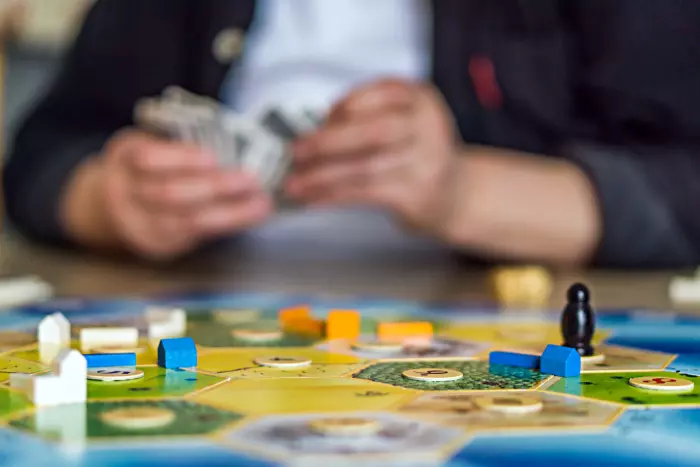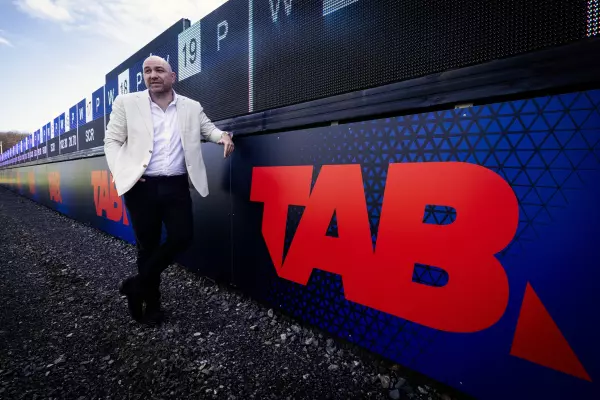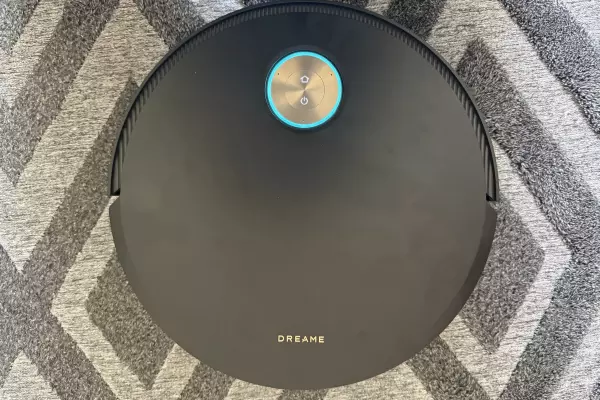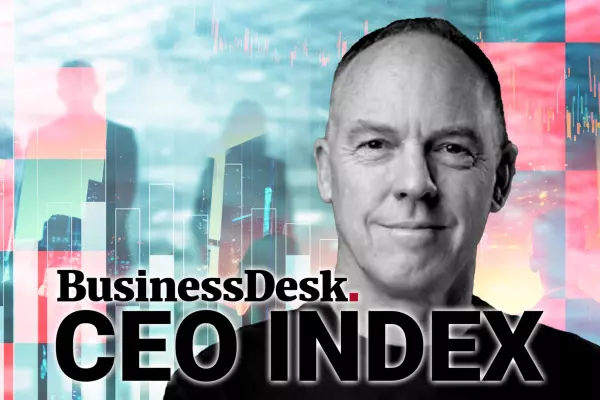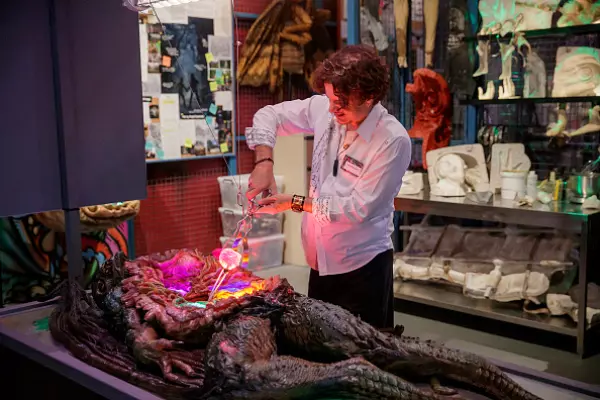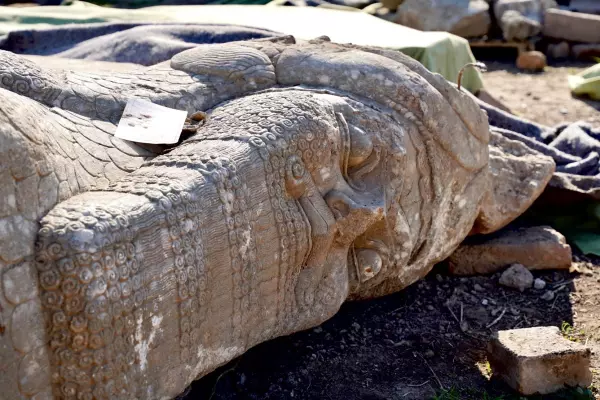The lament of the modern era is that as we move more and more online, we drift further away from in-person communities.
In New Zealand, teenagers are disengaging from the community, loneliness is on the rise, and we are spending on average more than six hours a day on screens.
And yet despite this, or perhaps because of this, the tabletop gaming industry has seen huge growth in the past couple of decades.
Among that wave are several NZ companies, including one that topped the Deloitte Fast 50 in 2022 with an astounding 6,416% growth in revenue.
Tabletop games cover a variety of genres and formats including board games, war games, trading card games (TCGs) and role-playing games.
While many of these games can be played online, the one thing they all have in common is that they are more fun when played in person.
Community at the centre
James White is the chief executive and co-founder of Legend Story Studios, which produces the Flesh & Blood TCG that has seen massive success, topping the Deloitte Fast 50 in 2022.
White himself was raised in Napier and credits the community he found playing Magic: The Gathering (now his biggest competitor) with helping him become the NZ success story he is today.
White’s passion for bringing people together was palpable when he described his company’s purpose.
“Our mission statement is to bring people together in the flesh and blood through the common language of playing great games, and typically that happens by people congregating in public spaces.”
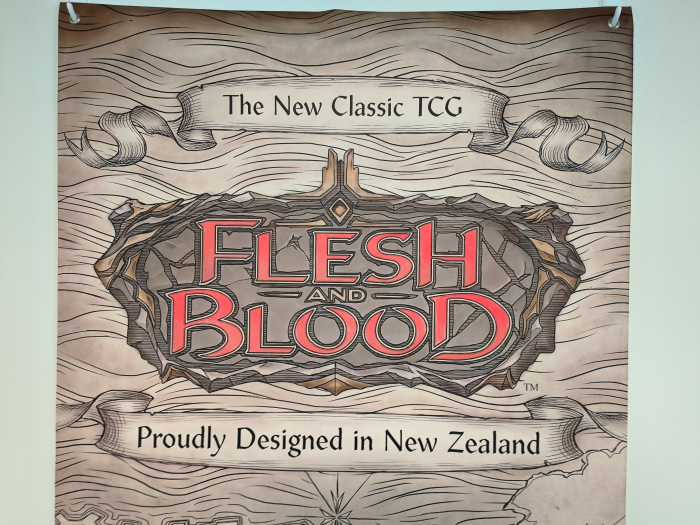
James White said his company's Aotearoa New Zealand providence is a matter of pride. (Image: Legend Story Studios, taken by BusinessDesk)
This concept of community is core to success in the tabletop space and the industry, which was seen in the recent conflict between Hasbro and Dungeons and Dragons players.
White has doubled down on this and made it a core part of his business model, supplying only to stores that have space for people to play.
“It comes back to our mission, which is to bring people together in the flesh and blood through the common language of playing great games,” White said.
“We don't want this product just to be flowing to retailers who don't give a shit about that, who just dump it on eBay, or Amazon or whatever. We're not interested in those retailers.
“We’re interested in the stores that have the tables and chairs, that run a Flesh & Blood event every Friday night, or every Saturday, where 15 to 40 people are coming into the store to have those in-person experiences. That's the store that we care about.”
Ironically, it is this restriction that has proven to many TCG fans that the company is committed to the community and helped to spur its massive growth.
While this renaissance of in-person experience may be driving the tabletop games industry to new heights, it is the advent of the online world that gave it an adrenaline shot, especially for NZ.
Enter: The Internet
Phil Yates is a games designer at Gale Force Nine (GF9), a NZ-based studio that creates board games based on existing intellectual property, like Spartacus and Doctor Who.
Yates has been part of the gaming community for decades and witnessed the change that the emergence of the internet and digital tools has inspired.
He said it used to be the case that, as a wargames enthusiast, information was filtered through physical magazines and what could be mail-ordered from the US or Europe.
“In the 80s and 90s, the world had lots of groups of 5, 10, 20, or even maybe as many as 50 wargamers or boardgamers getting together with very little connection, apart from the magazine, to the rest of the world,” he said.
“The advent of the internet started creating groups of thousands, tens of thousands, and made a company like Battlefront [the wargaming-focused parent of GF9] really possible.”
As this lifeline to the global community of gamers and the connectivity between them was driven by the internet, so too was the potential for businesses that served these communities as websites and groups popped up to discuss new games, which could then be sold to.
Yates explained: “Between social media and BoardGameGeek [a community board game review site] and YouTube and so forth, marketing is very democratic these days, rather than being focused on a few big companies and magazines, and so I see the opportunities for NZ are bigger than ever.”
Digital channels for physical products
Three of the four people BusinessDesk spoke to for this article pointed to Kickstarter as an example of how digital tools have changed the industry in NZ and beyond.
The website allows even a single creator to be able to get committed capital with just an idea and some marketing material.
With that capital, there are factories in China that are dedicated to producing tabletop gaming products – Long Pack Games and Whatz Games are two examples.
They receive the specifications online and, once samples are sent and approved, send the product in boxes directly to distribution centres across the world.
GF9, for example, has its own factory in Malaysia, though some parts are still manufactured in China, which sends to warehouses in cities that act as regional distribution centres.
While GF9 is a larger international company, the same approach has allowed for even a one-person business – Cheeky Parrot Games – to find success.
Julia Schiller is the founder and director of Cheeky Parrot Games, which publishes ‘fun for the whole family’ games.
She said that this model, along with her keen eye, has seen her grow from nothing to reaching break-even in just a few years.
Huge opportunity, passion at the core
As evidenced by James White’s Flesh & Blood game, the market for good games internationally is huge, and is accessible for New Zealanders.
But what success means depends on what that person wants. For White, it was to re-invigorate what he saw as a foundering community on a global scale.
Schiller said that while she was happy with the direction of her business so far, she sees far more opportunity out there if she could crack the tricky US or European markets.
But her focus is really on doing what she enjoys, promoting the games she loves to the people that want to play them – especially those designed by women.
“BoardGameGeek’s … top 100 games list, there's so few women on the covers,” she said.
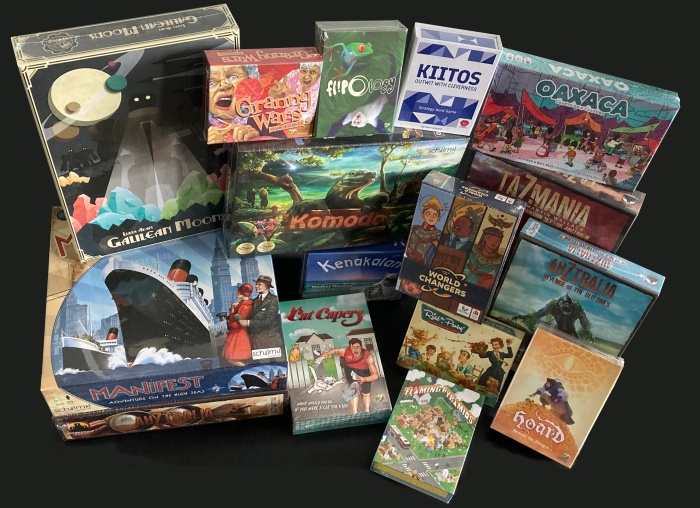
Cheeky Parrot Games' full portfolio includes Hoard, which features a female figure on the cover. (Image: Cheeky Parrot Games)
“Once I saw a dad with his two little girls and they were quite absorbed in a game of [Cheeky Parrot game] Horde, and Tim, who was my co-designer and the artist, said, ‘Yeah, it's amazing what happens when you put a girl on the cover.'”
GF9’s Yates said it was about creating a hit that the lovers of the original IP would also love.
Shem Phillips, who founded Garphill Games and produces historical and mechanics-heavy board games, said he wouldn’t want to be the next Hasbro if that meant he couldn’t personally try each game the company produced.
Phillips added that he would love to see more NZ tabletop game companies breaking into the market.
“If anyone's wanting to get involved in the business side of things in NZ, for board games, there's a lot of space to do it,” he said.
“There's more competition now than there was even three years ago, but there's [board game] cafes popping up and restaurants, which is cool to see … and there's probably more space for it to happen around NZ.
“There's really only one main distributor in NZ, so there’s a lot of space there to get involved with distributing games or facilitating Kickstarters.
“It’s still not a very busy or filled-up space for business.”
NZ’s potential
There are people and events around the country, including the just-passed conference-cum-fundraiser the Games Fair, which are trying to bring the tabletop gaming world together and bolster the industry in NZ as it slowly swells across the world.
White spoke passionately about the benefits that the tabletop gaming industry can bring to NZ, saying that distance and size were less important than ever, as it is the weightless aspects of the physical products that are the most valuable.
“We need to shine the spotlight on NZ, that we have an incredible creative industry," White said.
“We can pivot our economy to being like, 'Remoteness doesn't matter anymore.' Actually, we're an information exporter. We're an IP exporter. We're a technology exporter.
“For me, that's kind of why I want to champion NZ as a place where creatives can survive and thrive down here.”


